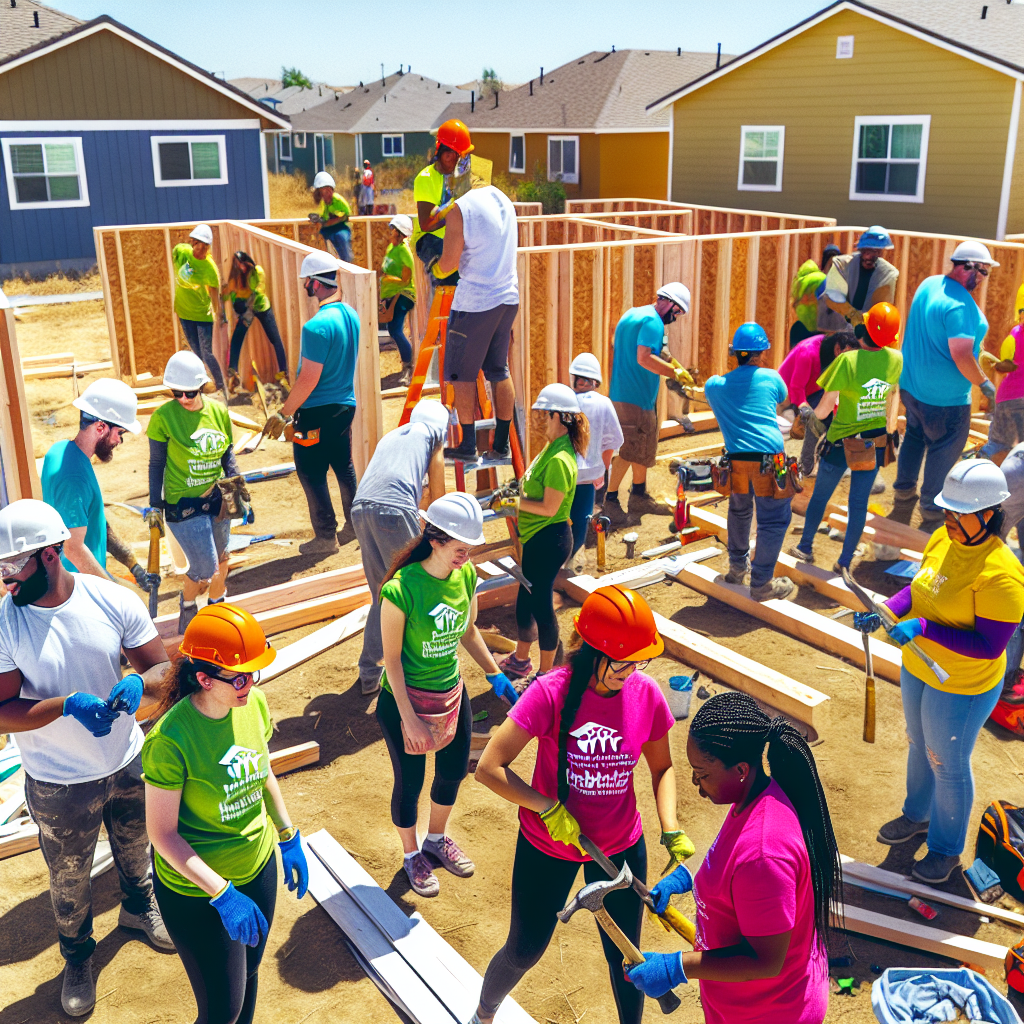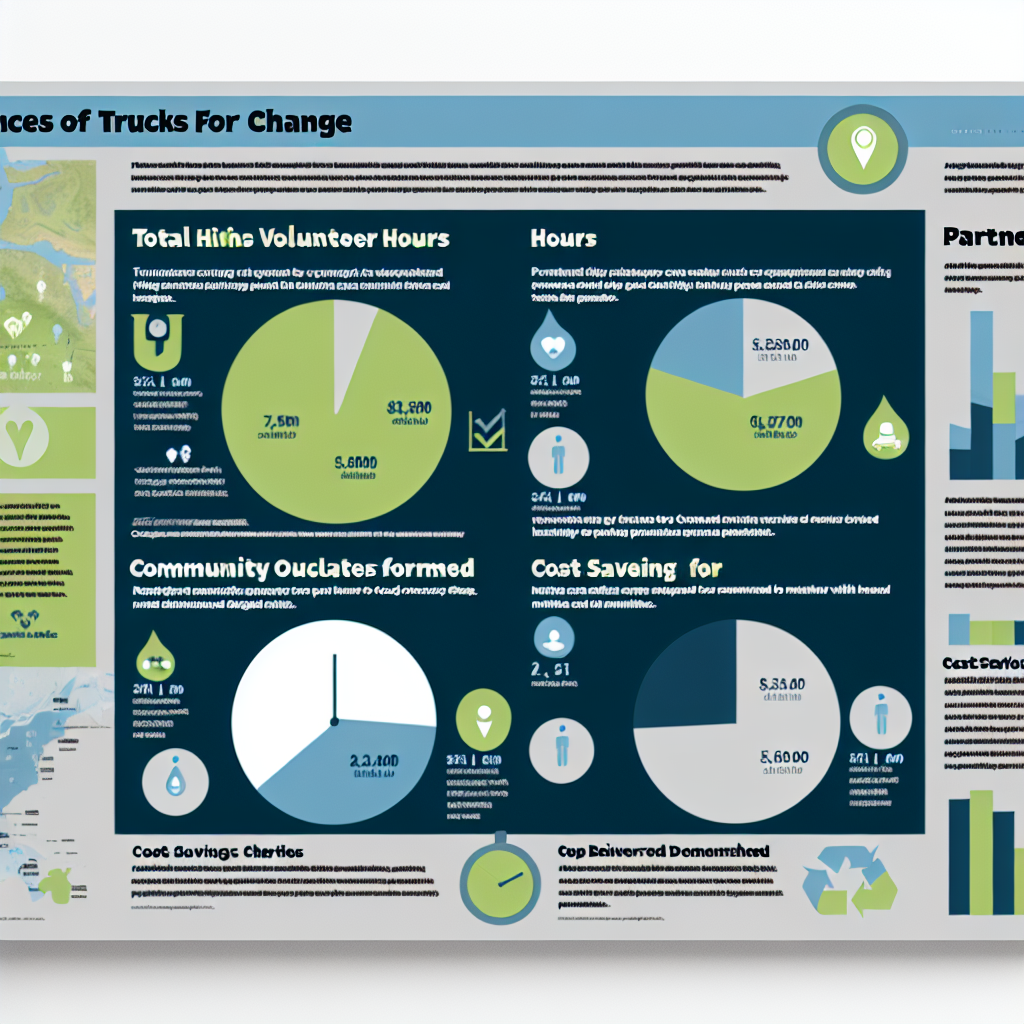In today’s world, the trucking industry isn’t just about transporting goods; it’s also about forging strong community bonds and giving back to those in need. Initiatives like Trucks for Change are at the forefront of this movement, embodying a commitment to social responsibility and championing community support. By actively engaging in projects that uplift vulnerable populations, the trucking community demonstrates that the road to success is paved not only with logistics and efficiency but also with compassion and collaboration.
Through partnerships with organizations such as Habitat for Humanity, Trucks for Change has shown that it is possible to drive change while making a tangible difference in the lives of individuals and families in need. As we delve deeper into the impact of these initiatives, we uncover how they reflect the heart of an industry dedicated to making a positive imprint on the communities we serve.


The History of Trucks for Change
Founded in 2006, Trucks for Change has made significant strides in leveraging the resources of trucking professionals for community service and support. The initiative was inspired by a community-centered vision to engage the trucking industry in giving back, particularly by partnering with non-profit organizations like Habitat for Humanity. With the leadership of executive director Betsy Sharples, Trucks for Change has evolved from a nascent idea into a robust movement that unites various stakeholders within the logistics sector. The organization has embraced its mission to provide logistical support and volunteer manpower to charitable projects, demonstrating a profound commitment to making a positive impact on vulnerable communities across Canada.
Over the years, Trucks for Change has expanded its initiatives, developing collaborations with numerous companies including The Erb Group, Kriska Transportation Group, and Mill Creek Motor Freight, facilitating thousands of hours of volunteer work. By engaging trucking professionals as agents of change, Trucks for Change exemplifies a paradigm shift within the industry, where corporate social responsibility is paralleled by a genuine desire to support local communities through dedicated efforts and volunteerism. As their partnerships grow, particularly with Habitat for Humanity, the mission to foster affordable housing and community upliftment continues to gain momentum, solidifying Trucks for Change as a model for merging business with benevolence.
| Year | Key Initiatives | Participation Metrics | Hours Contributed | Partnerships Formed |
|---|---|---|---|---|
| 2024 |
|
|
Not specified |
|
| 2023 |
|
|
Not specified |
|
| 2022 |
|
|
Not specified |
|
| 2021 |
|
|
Not specified |
|
| 2020 |
|
|
Not specified |
|
| 2019 |
|
|
Not specified |
|
Note: Specific data for some years may not be publicly available.
These initiatives highlight T4C’s ongoing commitment to leveraging the transportation industry’s resources for community benefit, fostering partnerships, and encouraging volunteerism among its network.
Volunteer Experiences with Trucks for Change
The Trucks for Change program has been a beacon of hope and support through the dedicated efforts of volunteers who participate in projects aimed at improving the lives of many, particularly in the realm of affordable housing. Each year, numerous volunteers lend their time and expertise in partnership with Habitat for Humanity.
These volunteers actively engage in building homes for families in need while simultaneously forging a sense of community spirit.
Betsy Sharples, executive director of Trucks for Change, aptly summarizes the trucking sector’s commitment to these initiatives:
- “Habitat for Humanity events are always popular and a highlight for our T4C partners.”
- “This initiative is another example of the trucking sector’s deep-rooted commitment to supporting vulnerable Canadians in communities where we live and work.”
Volunteers report significant personal fulfillment from their contributions. One participant shared:
- “Being part of a team that builds homes not only makes a difference to families but also enriches our own lives, knowing we are making a positive impact together.”
- “It’s incredible to see how every nail we drive helps create a future for someone. It’s not just work for us, it’s a mission.”
The collaboration between Trucks for Change and Habitat for Humanity also leaves a lasting impact on homeowners. One delighted Habitat homeowner expressed:
- “I couldn’t have done this without everyone who came together from the community to make this happen. Without you, I wouldn’t have this opportunity and I cannot thank you enough.”
Adding a personal touch, volunteer John Smith recalls his experience vividly:
- “When I first started volunteering with Trucks for Change, I never imagined how much it would change my perspective. One family, in particular, touched my heart; a single mother with three kids working hard to find a stable home. Seeing them get the keys to their new house made all the hours we put in feel worthwhile. I left that day feeling accomplished, knowing I played a small role in a life-changing moment.”
As the partnership continues to grow, so does the community’s appreciation for the critical role volunteers play in transforming lives and fostering affordable housing solutions.
Together, volunteers with Trucks for Change and Habitat for Humanity are not just constructing homes; they are building hope, security, and a brighter future for many deserving families.
In its quest to make a significant difference, Trucks for Change (T4C) has emerged as a leader in collaborative community support, particularly through its partnerships with notable organizations like The Erb Group and Kriska Transportation Group. Together, they have provided over 2,000 hours of hands-on assistance, primarily focused on community-building projects such as supporting Habitat for Humanity.
This collective impact is evident in their achievements, which include the delivery of more than 2.5 million pounds of freight to 125 unique food banks and charities across Canada, thereby helping to facilitate 1.4 million meals for food-insecure families. Partner companies, including The Erb Group, have actively engaged in initiatives like the After the Bell program, while Kriska Transportation Group has participated in countless projects aligning with T4C’s mission.
This level of commitment and collaboration reflects the heart of the trucking industry’s social responsibility efforts, showcasing how united actions can lead to transformative outcomes for communities in need.
In conclusion, the impactful efforts of Trucks for Change exemplify the vital role that community initiatives play in the trucking industry. Through dedicated partnerships with organizations like Habitat for Humanity, they are not merely transporting goods; they are facilitating change that addresses the pressing needs for affordable housing in our communities. The ongoing commitment to volunteerism and social responsibility demonstrated by Trucks for Change is a testament to what can be achieved when collective efforts align with a noble cause. With over 2,000 hours of volunteer assistance and countless lives transformed, the footprint of compassion and community support continues to grow.
Moreover, the support expressed by stakeholders reflects an industry-wide transformation where companies prioritize social impact alongside their business objectives. As these initiatives flourish, they emphasize the trucking sector’s ability to contribute positively, beyond logistics, to the well-being of society at large. The partnerships formed through Trucks for Change and collaborative projects not only uplift those in need but pave the way for a unified approach to community engagement that inspires others to follow suit.
As we reflect on the profound outcomes of these initiatives, we encourage readers to consider how they can contribute to similar efforts in their own communities. Every voice, every action, and every effort counts. Volunteer your time, contribute your resources, or even share the mission of these initiatives within your community. Join the movement, and help build a brighter future for those in need alongside Trucks for Change and its partners. Together, we can drive change and uplift vulnerable populations—because community support is not just an initiative; it is our responsibility.
User Adoption Data Summary: Community Support Initiatives
The impact of community support initiatives like Trucks for Change is prominently reflected in user adoption and engagement data from various organizations in the trucking sector. Here are some notable examples:
- Averitt Associates has emerged as a notable champion of community engagement, dedicating an impressive 37,401 hours to community service in 2024. This effort was facilitated through their Team Up Community Challenge, engaging 115 teams and supporting 235 organizations. This increase in participation showcases a robust commitment to community involvement within the trucking industry, echoing the spirit of Trucks for Change.
- C.H. Robinson has also made significant contributions, with nearly $1 million allocated to support the trucking community through scholarships and donations in 2024. These contributions indicate a growing trend of financial investment in workforce development and partnership support, crucial for enhancing community welfare.
- The Trucking Cares Foundation donated a record of $200,000 to various charitable efforts, including disaster relief and workforce development initiatives in 2024. This increase signals a wider commitment across the sector to tackle pressing societal issues and reflects the ethos of communal responsibility, similar to that seen in Trucks for Change activities.
- Bay and Bay Transportation emphasizes the importance of community involvement, stating that such engagement can significantly bolster the trucking industry’s reputation and operational success. Their initiatives have fostered better community relations and public understanding of the trucking sector’s role in supporting daily life.
These statistics illustrate the essential role that organizations such as Trucks for Change play in enhancing community engagement and offering support. The collaborative efforts of trucking companies offer not only logistical assistance but also a genuine commitment to fostering meaningful connections within communities. The evidence of increased volunteer hours, financial contributions, and partnerships highlights the collective drive toward a more supportive ecosystem, demonstrating how the trucking industry can make a tangible difference in the communities it serves.
Overall, these insights reflect a strong trend of community-focused initiatives within the trucking industry, showcasing an ongoing dedication to social responsibility and community enrichment. The impact of programs like Trucks for Change is clear: they create a ripple effect of positive outcomes, uplifting the levels of community support and engagement across various sectors.
Additional Resources
Key Takeaways
- Community Engagement: Trucks for Change exemplifies how the trucking industry is not solely focused on logistics but is also deeply committed to community welfare, as evidenced by numerous initiatives supporting vulnerable populations.
- Partnerships with Non-Profits: Collaborations with organizations like Habitat for Humanity display a strategic approach to address pressing social issues, such as affordable housing, allowing both volunteers and companies to give back meaningfully.
- Commitment to Volunteerism: With over 2,000 hours of collective volunteering, the initiative showcases the passion of trucking professionals who dedicate their time to improve lives and foster community development.
- Significant Contributions: The involvement of various trucking companies, including The Erb Group and Kriska Transportation Group, highlights the industry’s potential to collectively drive social change through dedicated service and support.
- Transformative Impact: The initiatives led by Trucks for Change serve as a model for social responsibility in the trucking sector, demonstrating how focused efforts can lead to meaningful change and uplift communities in need.
- Encouragement for Engagement: Readers are encouraged to partake in similar community support efforts, whether through volunteering or by raising awareness, to join the movement for change alongside Trucks for Change and its partners.

This infographic summarizes key statistics and the overall impact of the Trucks for Change initiative, highlighting aspects such as volunteer hours contributed, partnerships formed with organizations like Habitat for Humanity, community outcomes, and cost savings for charities.
Key Statistics:
- Total Volunteer Hours: Over 2,000 hours contributed.
- Partnerships Formed: 44 transportation partners and 15 sponsors.
- Meals Delivered: 1.4 million meals facilitated for food-insecure families.
- Transportation Cost Savings: More than $150,000 saved by charities.
- Emergency Relief: Quick response during emergencies such as wildfire relief efforts.
